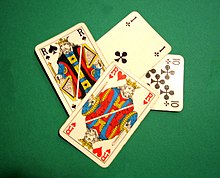Twenty-eight (card game)
 |
|
| Origin | India |
|---|---|
| Named variant | Twenty-nine Forty |
| Type | Trick-taking |
| Players | 4 |
| Skills required | Memory, Tactics |
| Cards | 32 |
| Deck | Anglo-American |
| Play | Counter-clockwise |
| Card rank (highest to lowest) | J 9 A 10 K Q 8 7 |
| Playing time | ~5 minutes per game |
| Random chance | Medium |
| Related games | |
| Jass, Klaverjas | |
Twenty-eight is an Indian trick-taking card game for four players, in which the Jack and the Nine are the highest cards in every suit.
Twenty-eight originated in India. The game is believed to be related to the European family of Jass card games, which originated in the Netherlands. These games are believed to have been brought to India by Indian South Africans who were also influenced by the Afrikaaner game of Klaverjas.
Twenty-eight is most popular in South India, particularly in the state of Kerala where it is known as Irupathiyettu (Malayalam: ഇരുപത്തിയെട്ട്) or Thuruppu (Malayalam: തുറുപ് Trump). Twenty-nine is a variation of the game that is popular in North India and Bangladesh. Both games are also related to 304, a card game popular in Sri Lanka and Nepal.
28 is usually played by four players in fixed partnerships, partners facing each other. 32 cards from a standard 52-card pack are used for play. There are eight cards in each of the usual "French" suits: hearts, diamonds, clubs and spades. The cards in every suit rank from high to low: J-9-A-10-K-Q-8-7. The aim of the game is to win tricks containing valuable cards.
The total number of points in the deck is 28, hence the name of the game. The values of the cards are:
Deal and play are counter-clockwise; the cards are shuffled by the player who is in the left . Four cards are then dealt to each player.
Based on these four cards, players bid for the right to choose trumps. Each bid is a number, and the highest bidder undertakes that his or her side will win in tricks at least the number of points bid. The player to dealer's right speaks first, and must bid at least 14 or it can be more. Subsequent players, in counter-clockwise order, may either bid higher or pass. The auction continues once until the player passes and the bid moves on to the next player.
...
Wikipedia
